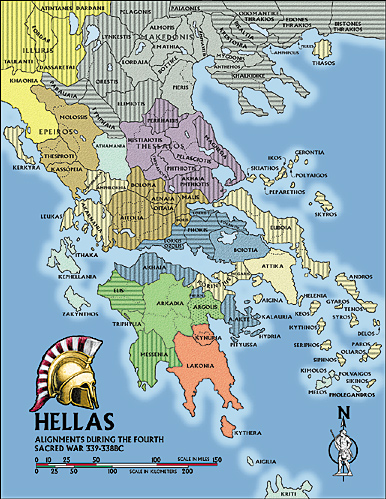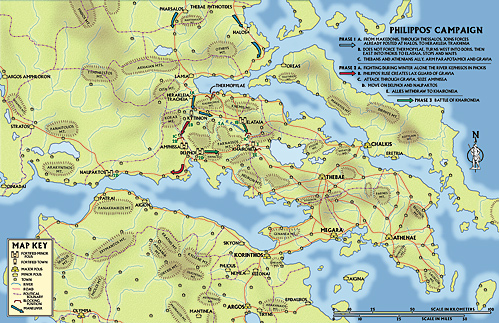
During the king's long absence from the South, the rivalries among the city-states flourished. The Lokrians of Amphissa, a city in Lokris Ozolis (Western Lokris), intended to propose a motion in the Amphiktyonic Council charging the Athenians with impiety when rededicating a triumph during the Phokian control of Delphoi. They sought to fine Athenai 50 talents.
These Amphissans were partisans of Thebai, and they expected Boiotian support for their motion. But the Amphissans were vulnerable to a counter charge for violating Amphiktyonic regulations for use of the sacred plain of Kirrha, below Delphoi. One of the Athenian delegates, Aischines, was a better orator than Kallikron of Amphissa, and his argument won the vote.
The following morning the young men of Delphoi and the officials and delegates of the Amphiktyonic Council met to reclaim the sacred lands. Encroachments on the harbor of Kirrha were torn down and houses burnt. The reclamation abruptly ended as the righteous Delphinians were attacked and scattered by a band of indignant Amphissans.
The next day the Amphiktyonic assembly voted that unless Amphissa offered satisfaction before the autumn meeting, sacred war would be declared on Amphissa.
During the intervening months the citystates maneuvered. Thebai was sympathetic to Amphissa and intended to abstain from the war if it was voted. In Athenai, those who wanted to see the Makedones humbled lined up behind Amphissa and Thebai. Chief among them was Demosthenes.
His opponent, Aischines, preferred to see Thebai humbled. Given the number of votes Philippos controlled, the Athenians thought that the king had instigated the original Amphissan motion against Athenai, intending to isolate the Athenians and perhaps force a sacred war against them. Demosthenes secured passage in the Athenian assembly of a declaration that Athenai will not participate in the Amphiktyonic meeting.
Amphissan intransigence caused the president of the Amphiktyony to call an early synod at Thermopylai (summer, 339 BC). War was declared on Amphissa, and the president, Kottyphos, a Thessaliote from Pharsalos, was appointed general. The ensuing campaign was a farce as few states participated.
The Thebans seize Nikaia and expel the Thessaliote garrison. While ostensibly allies of Philippos, by this act Thebai closed Thermopylai to him. This overt step made obvious to all that Thebai would stand against the king if he moved south against Amphissa. Demosthenes was delighted, for now the possibility of uniting Athenai and Thebai in common cause against Philippos was real.
At the autumn Amphiktyonic meeting the Amphissans refused to pay the fine. They restored the Amphissan leaders exiled by Kottyphos and expelled the leaders appointed by Kottyphos. In response, the Amphiktyony appointed Philippos as hegemon.
Theban Choices
Recovered from his wound, in the late autumn, Philippos had three wars to consider. The hostilities with Byzantion and her Hellenic allies had concluded, but a condition of war still existed with Persia. The Athenians declared war with news of the king's seizure of the grain fleet the previous year. And now the king was appointed to lead the sacred war against Amphissa.
The war with Persia could languish. The war with Athenai could not be pursued directly, for the king would have few allies for that endeavor. The war with Amphissa would serve as a rallying cry, for whatever states supported Amphissa would be in the wrong.
How Thebai and the Boiotians would act was not a certainty. Athenai was their traditional enemy. Supposedly Thebai was allied to Philippos. They might fulfill their obligations to the king and to the Amphiktyony, and there were voices among their citizens supporting that choice. There also were voices arguing on Athenai's behalf as the only alternative to being totally eclipsed by Philippos.
Certainly Philippos did not want Thebai united against him with Athenai. Yet he probably preferred his enemies facing him than to be betrayed by a Thebai in the midst of his campaign.
Thebai and the Boiotians were the strongest of his potential opponents. They paid their men to train, and in the Sacred Band they possessed an elite force to spearhead the fighting. If they joined with Athenai, they would also be joining with Korinthos, Megara, Euboia, Akhaia, and others.
 Philippos' Campaign: 1st Phase
Philippos' Campaign: 1st Phase
Philippos marched south at the head of his Makedones. The rapid march surprised his enemies. Thessaliotes joined him en route. Reaching the coast in Malis, he turned west toward the mountains. Phthians joined him. Crossing the passes of Oitaia, he descended to the city of Herakleia Tracheia. There he had a choice: try to force the pass at Thermopylai or turn west again.
He led his army northwest, ascending Mt. Oita and Mt. Kallidromos to reach the high canton of Doris. He garrisoned the Dorian city of Kytinion. The march from Oitaia to Kytinion added men to his army from Oitaia/Aenaia, Dolope, Doris, and even Aitolia. At Kytinion he was ten kilometers north of the Gravia pass between Mt. Parnossos and Mt. Korax. The road through the pass would lead him to Amphissa.
But the pass was occupied. And Amphissa was prepared for his coming.
Instead, Philippos marched east into defenseless Phokis, down the Kephissos River valley, to the town of Elateia on the Boiotian frontier, which he fortified (November, 339 BC). His speed surprised his enemies. The move to Elateia turned the Theban position at Themopylai. He might have overrun Boiotia then, but he stopped, paused, waited.
He sent an embassy to Thebai: the Makedones officers Amyntas and Mearchos, the Thessaliote tetrarchs Daochos and Thrasydaios and representatives from Aenaia, Aitolia, Dolope, and Phthiotis. They request two concessions from Thebai.
That the Thebans hand over Nikaia at Themopylai to an Epiknemidian Lokrian (East Lokrian) garrison and that the Thebans and Boiotians either join in the attack on Amphissa or permit passage of his army.
In Athenai, the people were frantic at the news of Philippos at Elateia. They knew he was a three-day march from their city. The news arrived in the evening, and by morning the full assembly gathered. Demosthenes proposed mobilizing all men of military age to march by way of Eleusis to reinforce Thebai. He proposed the appointment of ten envoys with authority to negotiate an alliance with Thebai. His proposals were accepted and he was voted the chief negotiator.
The Athenian envoys traveled quickly to Thebai. There they offered to:
- 1. Repudiate Athenian support for the
independence of Boiotian cities
2. Give Thebai supreme command by land, with Athenai sharing command by sea
3. Provide two-thirds of the land war costs, with Thebai paying only one-third
4. Pay all of the naval war costs, and
5. Locate the joint war office in Thebai.
Philippos' envoys were unable to prevail over Theban mistrust and Athenian war fervor. The Thebans allied with Athenai.
Soon the Athenian army reached Thebai. The Allies moved to block both the Amphissan and Elateian routes. While Philippos continued to negotiate, a force of 10,000 mercenaries under the joint command of the Theban Proxenos and the Athenian Chares took up positions at the Gravia pass. The main Allied army was established at Parapotamioi, where the River Kephissos enters a narrow gap between Mt. Parnossos and Mt. Hedylion. They also fortified the Phokian towns of Lilaia and Ambrysos, blocking the high routes through Mt. Parnassos.
Although Philippos did not hold Nikaia, he did control the Thermopylai pass proper, which he fortified. In effect, the opposing sides faced each other across the breadth of Central Hellas. One move that Athenai might have taken but didrA, was to reinforce her Akhaian allies at the city of Naupaktos on the Aitolian coast or, at least, keep a fleet in the Korinthian Gulf to prevent any reinforcement of Philippos from his Peloponnesianallies.
Philippos' Campaign: 2nd Phase
Diplomatic maneuvers continued through the winter. The king's lengthy negotiations with the Thebans and with other states, and his appeals for peace, achieved one goal. They caused the Hellenes to recognize the war as an Amphiktyonic war and not a continuation of the war between Athenai and Philippos. That served to keep many states neutral, such as Sparte, Elis, Argos, Arkadia, Messenia, and the states of the Akre. Some states, like the Epiknemidian Lokrians, now sided with the king.
Phokis was occupied, the north by the Makedones and the south by the Allies. Traditionally, the Phokians hated Thebai and felt goodwill toward Athenai. Yet they must have understood that their restoration as a state was dependent of the king's success. While some Phokians were levied by the Allies, for the most part, Philippos counted on Phokian support.
An attempt by the king's forces to push across the River Kephissos was beaten back. Other small-scale actions occurred throughout the winter. Because the Allies had a greater supply problem, with their forces split by Mt. Parnassos, they set up several fortified posts to protect their routes. One such post was ravaged and burned by Philippos' men, which drew the Boiotian forces out of their strongholds and allowed the Makedones to slip by complete their raid.
With winter yielding to spring, Philippos worked a ruse. The Allies captured a false dispatch. In it were orders withdrawing the Makedones army from Kytinion. According to the dispatch, troubles in distant Thrakios necessitated the king shifting his forces and sending a part of his army north.
The mercenaries guarding Gravia pass relaxed their vigil. In the night some days later the Makedones attacked, seizing the pass and pressing on to Amphissa. Within hours the city was taken and the enemy under Proxenos and Chares scattered or captured (March, 338 BC or later in year). Those Allies in arms retreated across the Parnassian passes.
Instead of following the enemy, Philippos turned west. From Amphissa, Philippos moved on Delphoi, Kirphis, and Antikyra along the coast while he dispatched Parmenion with a strong force against Naupaktos. The Akhaian garrison at Naupaktos surrendered and was permitted to cross the Korinthian Gulf for home. The king fulfilled his promise to the Aitolians and returned the city to them. On the arrival of the Akhaian garrison in Akhaia, their fellow citizens executed them.
By early summer, the king had succeeded in turning the Allied position. The Allies abandoned Parapotamoi as useless for their defense. They withdrew five miles south to a new position anchored on the west by the acropolis of Khaironea below Mt. Petrakhos and on the east by the River Kephissos and Mt. Akontion beyond. The Allied line protected the Kerata pass south of Khaironea, which was their line of retreat. They also garrisoned the city of Lebadeia, which controlled the other end of the pass.
Early in the new Makedones month of Gorpiaios (August), Phillipos led his main army to Khaironea to confront the Allies.
Hegemon: Philip of Macedonia
- Introduction and His Army
Hegemonic Rivalry
The Third Sacred War
The Peace of Philokrates Erodes
The Wars With Byzantion and Scythians
A Fourth Sacred War Declared
The Battle of Khaironea (Chaironea)
Making the Peace
Jumbo Map of Greece (extremely slow: 659K)
Jumbo Map of Philippos' Campaigns (extremely slow: 557K)
Jumbo Map of Battle of Khaironea (extremely slow: 462K)
Back to Table of Contents -- Against the Odds vol. 1 no. 1
Back to Against the Odds List of Issues
Back to MagWeb Magazine List
© Copyright 2002 by LPS.
This article appears in MagWeb.com (Magazine Web) on the Internet World Wide Web.
Other military history articles and gaming articles are available at http://www.magweb.com
* Buy this back issue or subscribe to Against the Odds direct from LPS.
